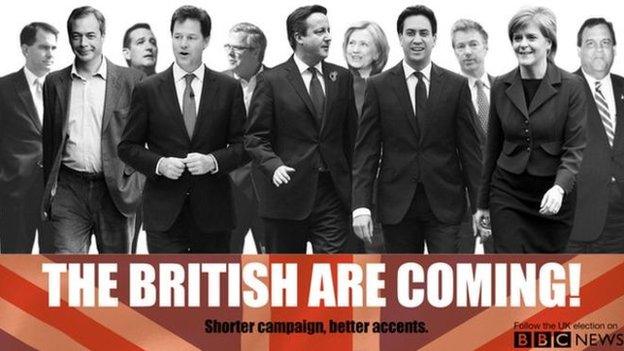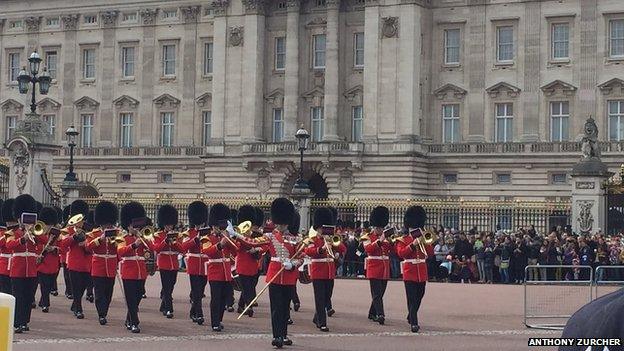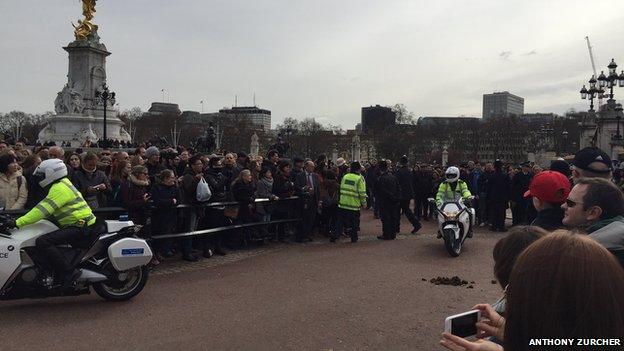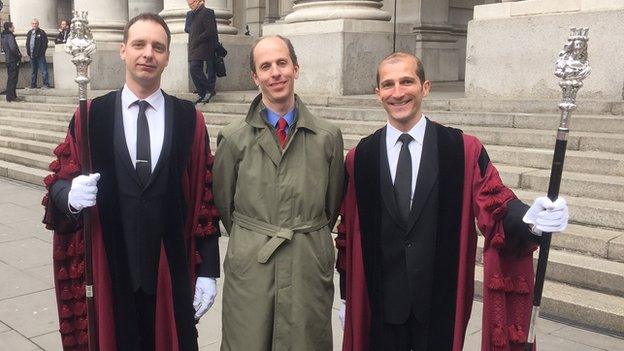Election 2015: An American's take on UK election pageantry
- Published
- comments

The BBC's Campaignspotting blog is taking a break from the marathon 2016 US presidential race to check out the political sprint that is the UK General Election. And they're off.
The crowd gathered outside the gates of 10 Downing Street knew something was up.
Although most were foreign tourists who just happened to be passing by, the police, the gathered reporters under television lights, the helicopters circling overhead and the motorcade waiting at the ready were all evidence that Monday, 30 March was not business as usual in the British political world.
In fact, Prime Minister David Cameron was making a short speech to announce the dissolution of Parliament and the official start of the 2015 General Election campaign. He then climbed into a dark limousine, which whisked him past the waving crowd for the short ride to Buckingham Palace and an audience with the queen.
Once upon a time - only four years ago, actually - a queen's visit was a necessity. It was only with her agreement that Parliament could be dissolved and an election held. Changes in British law, however, have rendered this formality no longer necessary.
Mr Cameron made the trip anyway. It should come as no surprise that the British enjoy the pageantry and give up cherished traditions reluctantly. And the prime minster likely appreciated the grand stage to launch his re-election bid, as well.

Marching guards outside Buckingham Palace ahead of David Cameron's visit to Queen Elizabeth II
Monday's ceremony - along with last Thursday's end of official business in Parliament, which had its own elaborate rituals - stand in marked contrast to the US political experience.
For Americans the campaign season begins with a whisper. Presidential aspirants angle behind the scenes for money and influence months - years, even - before the first ballots are cast. Candidacies - like those this year by Democrat Hillary Clinton and Republican Jeb Bush - are all but certain long before any formal announcements are made.
In Congress legislative business is suspended for campaigning with a bang of the gavel and nary a goodbye wave. Politicians quietly spread out across the nation for the business of wooing voters and assuring they keep their jobs.

Crowds of citizens, tourists and press wait outside the palace to see David Cameron arrive with a motorcade
Oh, and about those jobs. Starting on Monday, in Britain, all members of Parliament are officially out of work. With Parliament dissolved, their privileges of office are terminated and they must stand election as ordinary citizens. All indications of their previous position must be scrubbed from their titles, their correspondence and their websites. By the end of the day on Monday, their offices must be cleaned out.
That also is a stark contrast to members of the US Congress, who carry the trappings of office with them on the campaign trail, right through election day and even after.

Outside the Royal Exchange with constables carrying staffs made of 15th-Century silver. A Royal Proclamation is made summoning a new parliament.
Just last year members of Congress - the re-elected, the defeated and the soon-to-be-retired - came back to Washington after the public voted for further legislation in a last-ditch effort to pass bills and enact policy before a new Congress was sworn in on 6 January.
In the UK, however, the time for lawmaking is over until after the 7 May election. For the next month, it's all about politicking and vote-getting.